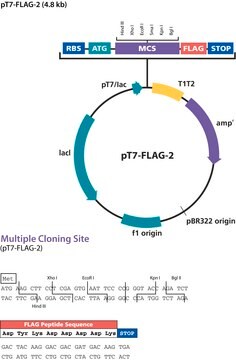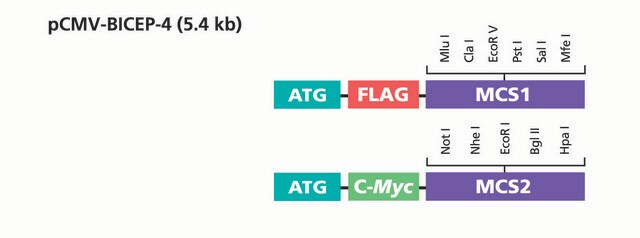Alle Fotos(1)
Wichtige Dokumente
E7029
pBICEP-CMV™-3 Expression Vector
Anmeldenzur Ansicht organisationsspezifischer und vertraglich vereinbarter Preise
Alle Fotos(1)
About This Item
UNSPSC-Code:
12171500
NACRES:
NA.56
Empfohlene Produkte
Allgemeine Beschreibung
The pBICEP-CMV-3 bicistronic expression vector is a 5.3 kb derivative of pCMV5 used for transient or stable co-expression of an N-terminal 1´ FLAGÒ fusion protein and a selection gene in mammalian cells.
Anwendung
For transient, cytoplasmic expression of an N-terminal FLAG® fusion and a second gene of interest or selection marker from bicistronic mRNA. Two genes can be cloned into MCS1 and MCS2 for transcription of a single message from the CMV promoter. This vector is useful for protein-protein interaction studies, multi-subunit proteins, and cloning a selection marker of choice.
Biochem./physiol. Wirkung
The presence of two multiple cloning sites not only allows the user to clone a target gene, but a selectable marker of their choice, as well. The promoter-regulatory region of the human cytomegalovirus immediate early promoter drives transcription of the FLAG-fusion construct along with a downstream selection gene. The EMCV IRES region controls translation of the selection gene by recruiting the ribosomal subunits for cap-independent translational initiation. Depending on the mode of selection, stable transfectants can be generated by transfection using the appropriate ESCORTä product line specific for the cell type.
Sonstige Hinweise
Browse additional application references in our FLAG® Literature portal.
Rechtliche Hinweise
FLAG is a registered trademark of Merck KGaA, Darmstadt, Germany
pBICEP-CMV is a trademark of Sigma-Aldrich Co. LLC
Ähnliches Produkt
Produkt-Nr.
Beschreibung
Preisangaben
Lagerklassenschlüssel
10 - Combustible liquids
WGK
WGK 3
Flammpunkt (°F)
Not applicable
Flammpunkt (°C)
Not applicable
Persönliche Schutzausrüstung
Eyeshields, Gloves
Hier finden Sie alle aktuellen Versionen:
Analysenzertifikate (COA)
Lot/Batch Number
Die passende Version wird nicht angezeigt?
Wenn Sie eine bestimmte Version benötigen, können Sie anhand der Lot- oder Chargennummer nach einem spezifischen Zertifikat suchen.
Besitzen Sie dieses Produkt bereits?
In der Dokumentenbibliothek finden Sie die Dokumentation zu den Produkten, die Sie kürzlich erworben haben.
R J Jackson et al.
Trends in biochemical sciences, 15(12), 477-483 (1990-12-01)
The initiation of translation of picornaviral RNAs takes place by an unusual mechanism whereby ribosomes bind directly to an internal site rather than scan the RNA from the 5'-end. This internal entry mechanism requires a 450-nucleotide segment of the picornavirus
S K Jang et al.
Journal of virology, 62(8), 2636-2643 (1988-08-01)
Picornavirus RNAs are uncapped messengers and have unusually long 5' nontranslated regions (5'NTRs) which contain many noninitiating AUG triplets. The translational efficiency of different picornavirus RNAs varies between different cell-free extracts and even in the same extract, such as micrococcal
P L Hallauer et al.
BMC genetics, 1, 1-1 (2000-10-19)
Versatile transgenic manipulation of skeletal muscle requires knowledge of the expression profiles of diverse promoter/enhancer elements in the transcriptionally specialized fiber types of which muscle is composed. "Universal" viral promoters/enhancers, e.g., cytomegalovirus IE1 (CMV IE1), are of interest as reagents
S Andersson et al.
The Journal of biological chemistry, 264(14), 8222-8229 (1989-05-15)
The conversion of cholesterol into bile acids in the liver represents the major catabolic pathway for the removal of cholesterol from the body. In this complex biosynthetic pathway, at least 10 enzymes modify both the ring structure and side chain
D R Thomsen et al.
Proceedings of the National Academy of Sciences of the United States of America, 81(3), 659-663 (1984-02-01)
The DNA templates containing immediate early (IE) genes of human cytomegalovirus (CMV) were transcribed in vitro by using a HeLa cell extract. When IE region 1, 2, and 3 were used, transcription was detected qualitatively only from IE region 1.
Unser Team von Wissenschaftlern verfügt über Erfahrung in allen Forschungsbereichen einschließlich Life Science, Materialwissenschaften, chemischer Synthese, Chromatographie, Analytik und vielen mehr..
Setzen Sie sich mit dem technischen Dienst in Verbindung.








